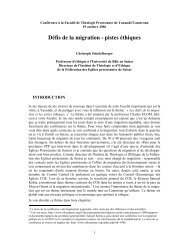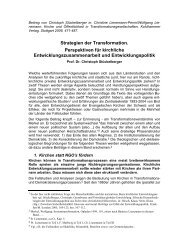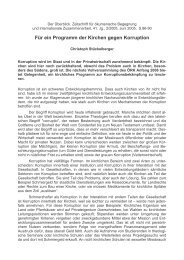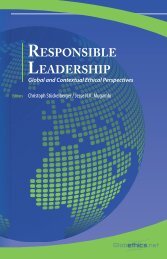BREAK THE CHAINS OF OPPRESION AND THE YOKE OF ...
BREAK THE CHAINS OF OPPRESION AND THE YOKE OF ...
BREAK THE CHAINS OF OPPRESION AND THE YOKE OF ...
You also want an ePaper? Increase the reach of your titles
YUMPU automatically turns print PDFs into web optimized ePapers that Google loves.
DEMoc rAcy system should be: is it the self-determination of the people and the conscious<br />
structuring of the political community, or is it, ultimately, the effective control<br />
of those in government?<br />
Is it all over now for democracy?<br />
Too complicated? Too obscure? Too ponderous? Too boring?<br />
In all discourses on political systems and processes it is evident that among different<br />
models of government the democratic system is still appreciated, not uncritically<br />
but it still meets with the greatest amount of approval. Whether classic democracy<br />
as we live it and wish to preserve in Europe and North America can be the appropriate<br />
export model for all other countries and societies is, however, not absolutely<br />
clear. At any rate, self-aware European democracies should be cautious<br />
with promises of salvation and suggestions of complete democratic prototypes as<br />
the solution for complex problems in cultures whose political structures they have<br />
recognised only in (very small) part, to say nothing of really understanding them.<br />
High time for preservation of democracy<br />
Global structures – if they exist – are chaotic and conflict-ridden. Over against<br />
the interconnectedness and scale of global society stands the lack, the absence of<br />
a close chain of transnational global institutions. The current lack of transparency<br />
also leads to problems of legitimation. Politicians do not help by keeping quiet<br />
about the fact that the modernisation of the world urgently requires the modernisation<br />
of society too. 15<br />
Politicians furthermore make a mistake in countering the spectre of globalisation<br />
simply with �comforting � words � such as “We �can �do<br />
it!” Apart from the fact<br />
that this immediately reveals a virtually paternalistic attitude to the decisionmakers<br />
their countries, namely their citizens, it is also simply not true. To obtain<br />
a balance between rights and regulations, between directing by the government<br />
and economic expectation – so that each complements the other and<br />
does so for the good of the global community – more is needed than to “whistle<br />
in the dark”.<br />
At the level of international organisations it must be made clear in what way exactly<br />
the powerful positions of mighty nations and the lobbyists of international<br />
capital stand a priori in the way of democratisation – and must this be changed.<br />
The path to democratisation can by no means pass the international institutions<br />
by and bases on which this can be prevented must be clarified without delay. It<br />
makes little sense to radically question international organisations. They are in<br />
most cases already attempts to achieve something in cooperation with others.<br />
15 Christoph Möller, Demokratie: Zumutungen und Versprechen, Berlin: Klaus Wagenbach<br />
Verlag, 2008, 122ff.<br />
��������������������������������������������<br />
� � � � � ������������������ �<br />
– DEMOCRACY – A MATTER <strong>OF</strong> CHOICE!? – 47










